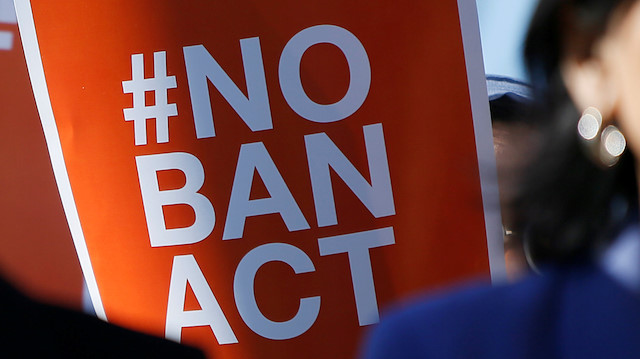
Nigerians account for single largest African immigrants in US with population of about 400,000 people
Condemnation and outrage reverberated in most parts of Nigeria after the U.S. President Donald Trump signed a proclamation that suspended issuance of immigrant visa to Nigerians and nationals of several other countries.
In a statement issued Jan. 31, the White House said: “President Donald J Trump has issued a proclamation maintaining entry restrictions on certain nationals of Iran, Libya, North Korea, Syria, Venezuela, Yemen, and Somalia .”
The proclamation also suspended overseas issuance of immigrant visas for certain nationals of Myanmar, Eritrea and Kyrgyzstan and Nigeria.
“It is unfair. It’s condemnable and unwarranted,” Collins Agada, a college graduate in Nigeria’s capital, Abuja told Anadolu Agency.
Collins, 30, said his plan to join his brother in the U.S. later in the year has been ruined by the new restriction order.
“I’m angry, frustrated! My hope dashed. I have been preparing for my visa. What should I do now?” he asked. He said he sold his electronics, computers and laptop to raise money for the U.S. visa process.
The U.S. government said it slammed immigrant visa ban on Nigeria for failure to “provide information necessary to comply with basic national security requirements—including sharing terrorist, criminal, or other identity information.”
Over a dozen young men gathered at a newspapers’ stand in the northeast Maiduguri city early Friday morning, debating the new U.S. ban on Nigerians. While some blamed the Nigerian government for the security lapses in the country, others criticized Trump’s relations with African nations.
“It is anti-Muslim,” Salihu Mohammed, 27, said.
“Not so at all!,” another interjected as tension rose between them.
“Our government should be blamed,” said 28-year-old Mamman Musa. The cacophonous voice coming from the scene drew more attention and interest from other locals nearby.
- Single largest African immigrants
Nigerians account for the single largest African immigrants in the U.S. with a population of about 400,000 people, according to the 2016 American Community Survey.
Hundreds of young Nigerians are regularly seen at the U.S. visa departments in Nigeria’s commercial hub Lagos or the capital Abuja, seeking U.S. visa.
Samson Nwagwu of the Say No Campaign -- an anti-corruption campaign initiative in the country -- attributed the increasing urge of Nigerian youths to migrate to the U.S. to limited opportunity, poor economy, unemployment, and poor governance fueled by corruption.
“More people are now desperate to seek residency in the U.S. and other western nations due to unemployment, systemic failure, incessant conflicts, and poor governance caused by corruption in the system,” he said.
Olabosun Awoniyi, a young entrepreneur based in Lagos, said the ban would break family ties. He cited cases of some Nigerians seeking to join other members of their families already residing in the U.S.
“The ban could affect relationship between Americans and Nigerians,” he argued. He said it would also affect ties between the U.S. and Nigeria.
But some Nigerians think otherwise.
Damian Okeke-Ogene, president of Ohaneze Ndigbo, a social cultural group in the country’s southeastern states, want Nigerian president to find an “urgent solutions to some of the U.S. concerns.”
He said the visa restriction only validated some of the challenges in the country. “We shouldn’t blame the U.S. government. We should tackle our problems,” he said.
- ‘Productive relations’
President Muhammadu Buhari, however, said Nigeria is committed to fix security challenges.
“Nigeria will remain committed to maintaining productive relations with the U.S. and its international allies, especially on global security,” Buhari’s spokesman Femi Adesina said in a statement.
Adesina said Buhari has formed a committee, headed by the interior minister, to “study and address the updated U.S. requirements.” He said the committee will work with the U.S. government, Interpol and other stakeholders to ensure the new requirement are implemented.
The visa restriction would not include tourists, students and business class, Adesina explained.
Last week, Nigeria had announced reduction in its visa application fee for visiting Americans from $180 to $160 to further strengthen its relations with the U.S.
A Nigerian delegation led by Foreign Minister Geoffrey Onyema also held discussions last week with the U.S. officials in Washington on the restriction order.
U.S. State Secretary Mike Pompeo said the discussion was centered on economic and security ties between the two countries.
“We’ve discussed how we can tidy up our cooperation,” Pompeo said as he praised Buhari’s fight against corruption.
He described Nigeria as the U.S.’ largest trading partner in Africa.
Hello, the comments you share on our site are a valuable resource for other users. Please respect other users and different opinions. Do not use rude, offensive, derogatory, or discriminatory language.
The floor is all yours.








